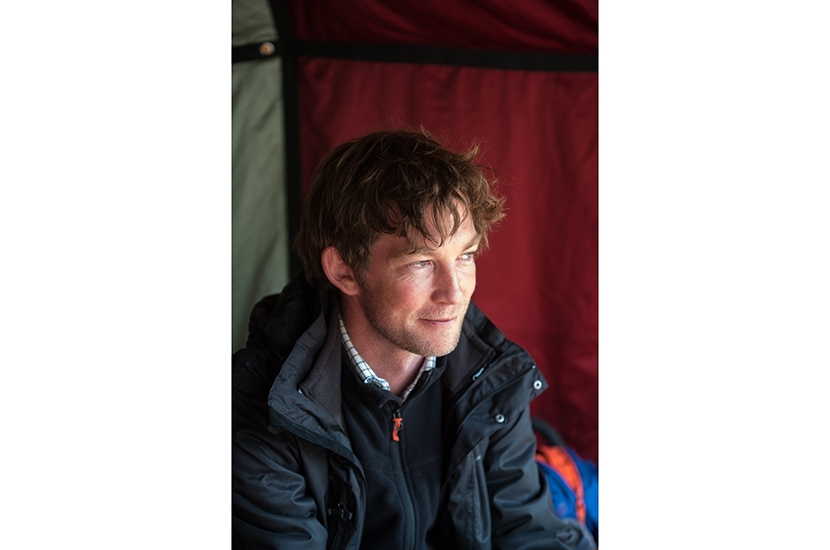What is it like to go mad? Not so much developing depression or having a panic attack — which is wearyingly familiar to many of us — but to go properly mad, the sort of madness that involves delusions and police officers and locked psychiatric wards? Horatio Clare didn’t have to imagine what that was like for his book Heavy Light. It’s a memoir, subtitled ‘A Journey Through Madness, Mania and Healing’, and is an unsparing tale not just of what it was like for him to succumb to a psychotic episode but also of what it did to his family.
The book starts with a skiing holiday in Italy with his partner Rebecca and the children. Already cracks are showing in Clare’s sanity: he is overworked, has been drinking heavily and smoking too much weed, and his family and friends are worried. Those friends circle him like moths, fluttering anxiously around his increasingly erratic behaviour, saying ‘I’m so worried about you, Horatio’, and repeatedly being dismissed. Clare is trying to behave normally while believing that he is in the middle of a secret military operation. He acts as the bodyguard to one of his friends, sends signals from his laptop to satellites, and drops heavy hints to those he suspects of being senior officers in the SAS.
Back in England, his frightened family tries to get him medical treatment. We are all familiar with the response: an overstretched NHS, and police trying to fill gaps they were never intended to occupy. Clare explains:
I found the crisis team very easy to deal with. You told them you were reducing your drug and alcohol intake, you told them you felt fine, you told them you were sleeping well, and on you went.
Horatio Clare tries to behave normally while believing he is in the middle of a secret military operation
Even when he’s taken to hospital after another incident, he ends up being discharged and a policeman breaks the news to Rebecca: ‘I am so sorry, I am so sorry but they’ve let him go. He’s talked his way out of it again.’
Eventually he is sectioned. ‘The next day, at last, they come.’ Reading his account of his detention feels like watching the scene through thick old glass: it is vague, confused and confusing at points — which is still more lucid than Clare will have seemed to the people around him that day. He has made a hole in the ceiling, pushed money into the drain and burned a cushion. Of course he only notices the extent of the damage much later, when he returns to the property after leaving hospital.
As he emerges from the acute phase of his illness on the psychiatric ward, he thinks more and more of the impact on his family of what has happened. He also develops an even stronger suspicion of the doctors who are treating him and the edifices of the psychiatric and pharmaceutical worlds behind them. When the hospital psychiatrist was trying to persuade him to start taking medication, he settled on aripiprazole, though he sobs as he takes it, writing rather theatrically: ‘I feel that by taking the pill I am murdering my muse.’ He rightly points out that the doctors don’t know how the pills work, but still insist that he takes them.
His suspicion carries us into the second part of the book, where he starts to examine current research on the causes and treatment of what doctors insist is his bipolar disorder. If he managed to talk himself out of the treatment he needed in the first section, this second is his attempt to write himself out of taking drugs which he feels are dulling him. It is fair enough, though: ‘This is my life and my career: why should I not have a second opinion?’ He interviews psychiatrists and other experts who believe the drugs don’t really work in the long term and that there are other ways of treating even serious mental illnesses.
The problem with this section is that Clare naturally seeks out people whom he hopes will confirm his theories about the world of psychiatry: that, far from being an exact science, it often has shifting sand at its foundations. This isn’t an exclusive revelation: other writers, including Johann Hari, have been trying to chip away at the biomedical model in psychiatry for some time — with mixed results.
The truth, I suspect — as someone who has been on a similar journey through illness and exploring how to treat it — is that there isn’t enough research being done on either the existing drugs or the potential alternative treatments to know. We’ve spent too long thinking that it is probably good enough for someone like Clare to be forced to take a chemical cosh without due thought for the effect on their ability to enjoy life.
Generously, Clare doesn’t make this book just about him. He is assiduous in charting Rebecca’s anxiety — her keenness for him to keep taking the pills, since for her they represent a form of security from the madness of the previous months. She would, presumably, be happy with an alternative if she knew that it too worked; but no one has really been able to cast enough light on what that is.
This article is free to read
To unlock more articles, subscribe to get 3 months of unlimited access for just $5








Comments
Join the debate for just £1 a month
Be part of the conversation with other Spectator readers by getting your first three months for £3.
UNLOCK ACCESS Just £1 a monthAlready a subscriber? Log in